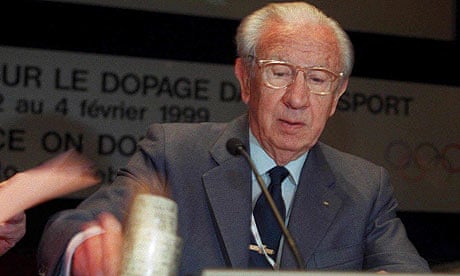Juan Antonio Samaranch, a reserved but shrewd dealmaker whose 21-year term as president of the International Olympic Committee was marked by both the unprecedented growth of the Games and its biggest ethics scandal, has died in a Barcelona hospital. He was 89.
Samaranch, a former diplomat who served as Spanish ambassador in Moscow, led the IOC from 1980 to 2001. He was considered one of the defining presidents for building the IOC into a powerful global organisation and firmly establishing the Olympics as a world force. Samaranch was admitted to the Quiron Hospital in Barcelona on Sunday after experiencing heart trouble and died at 1.25pm local time.
Small in stature and shy by nature, Samaranch appeared uncomfortable appearing or speaking in public. But behind the scenes, he was a skilled and sometimes ruthless operator who could forge consensus in the often fractious Olympic movement and push IOC members to deliver exactly what he wanted.
He was also a lighting rod for critics, who attacked him for his ties to the Franco era in Spain, his autocratic style and the IOC's involvement in the Salt Lake City corruption scandal. The Samaranch era was perhaps the most eventful in IOC history, spanning political boycotts, the end of amateurism and the advent of professionalism, the explosion of commercialisation, a boom in growth and popularity of the games, the scourge of doping, and the Salt Lake crisis.
Samaranch had been bothered by health problems ever since stepping down nine years ago. He was hospitalised for 11 days in Switzerland with "extreme fatigue" in 2001 after returning from the IOC session in Moscow, where Belgium's Jacques Rogge was elected as his successor. Samaranch was hospitalised shortly afterwards in Barcelona for what was described as high blood pressure. He spent two days in a hospital in Madrid in 2007 after a dizzy spell, and underwent hospital checks in Monaco in October 2009 after feeling ill at a sports conference.
Despite his advancing age and medical troubles, Samaranch continued to travel to IOC meetings around the world. He looked increasingly frail in recent months. Attending the IOC session at the Winter Games in Vancouver in February, he walked with the aid of a female assistant.
Even in retirement, Samaranch remained active in Olympic circles and tried to help Madrid secure the games of 2012 and 2016. Madrid finished third behind London and Paris in the vote for the 2012 Olympics, and second to Rio de Janeiro for 2016. Samaranch spoke during Madrid's presentation in Copenhagen on 2 October, 2009, virtually asking IOC members to send the Games to the Spanish capital as a parting gift for an old man close to his final days.
"Dear colleagues, I know that I am very near the end of my time," Samaranch said. "I am, as you know, 89 years old. May I ask you to consider granting my country the honor and also the duty to organise the Games and Paralympics in 2016."
In Moscow in 1980, as a little-known Spanish diplomat, Samaranch was elected the seventh president of the IOC, taking the most powerful job in global sports. Twenty-one years later, as a well-known world figure, Samaranch returned to Moscow to finish his term – basking in the unprecedented popularity and riches of the Games but still bearing the scars of the scandal that led to the ousting of 10 IOC members for receiving improper benefits from the 2002 Salt Lake bid committee.
While his closest friends said Samaranch was extremely emotional and sentimental, outwardly he remained cool and philosophical in his final days in office. "I'm feeling OK," he said. "Life is life. There is a beginning and an end. This is the end of my presidency. I've known for a long time that this day was coming."
Even at the end of his Olympic reign in 2001, Samaranch worked hard to achieve three electoral victories as part of his final legacy: the awarding of the 2008 Olympics to Beijing, the election of Rogge as the new president, and the appointment of his son, Juan Antonio Jr, as an IOC member.
Samaranch retired as the second-longest serving president in the history of the IOC. Only Pierre de Coubertin, the French baron who founded the modern Olympics, was in office longer, serving for 29 years (1896-1925). The American Avery Brundage served for 20 years (1952-72). Samaranch was the last IOC leader to stay in office for so long. Under new rules, the maximum term for the president is 12 years (one eight-year mandate, plus the possibility of an additional four-year term). Rogge was re-elected unopposed to a second term in Copenhagen on 9 October, extending his period in office until 2013.
"After de Coubertin, there is no question that Samaranch stands head and shoulders above the other presidents in terms of his impact, not only on the Olympic Games but the place of the Olympic movement in the world," the Olympic historian John MacAloon said. The Canadian IOC member Dick Pound, who finished third in the voting to Rogge, said Samaranch was one of three "great or defining presidents."
"De Coubertin to get it going, Brundage to hold it together through a very difficult period, and Samaranch to bring it from the kitchen table to the world stage," Pound said.
